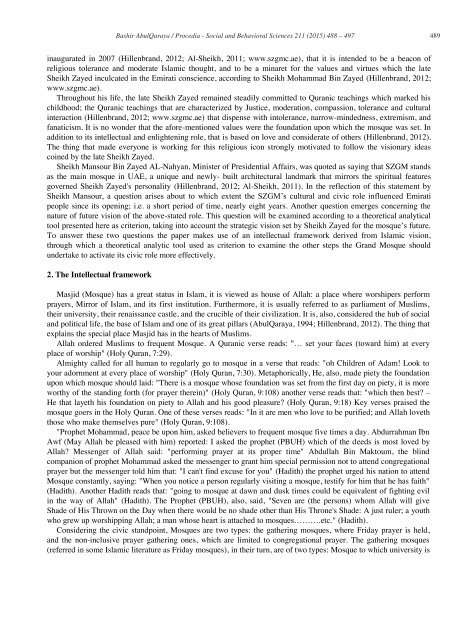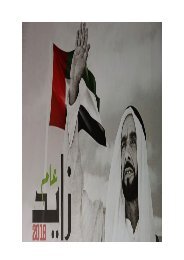1-s2.0-S1877042815054051-main
You also want an ePaper? Increase the reach of your titles
YUMPU automatically turns print PDFs into web optimized ePapers that Google loves.
Bashir AbulQaraya / Procedia - Social and Behavioral Sciences 211 ( 2015 ) 488 – 497<br />
489<br />
inaugurated in 2007 (Hillenbrand, 2012; Al-Sheikh, 2011; www.szgmc.ae), that it is intended to be a beacon of<br />
religious tolerance and moderate Islamic thought, and to be a minaret for the values and virtues which the late<br />
Sheikh Zayed inculcated in the Emirati conscience, according to Sheikh Mohammad Bin Zayed (Hillenbrand, 2012;<br />
www.szgmc.ae).<br />
Throughout his life, the late Sheikh Zayed re<strong>main</strong>ed steadily committed to Quranic teachings which marked his<br />
childhood; the Quranic teachings that are characterized by Justice, moderation, compassion, tolerance and cultural<br />
interaction (Hillenbrand, 2012; www.szgmc.ae) that dispense with intolerance, narrow-mindedness, extremism, and<br />
fanaticism. It is no wonder that the afore-mentioned values were the foundation upon which the mosque was set. In<br />
addition to its intellectual and enlightening role, that is based on love and considerate of others (Hillenbrand, 2012).<br />
The thing that made everyone is working for this religious icon strongly motivated to follow the visionary ideas<br />
coined by the late Sheikh Zayed.<br />
Sheikh Mansour Bin Zayed AL-Nahyan, Minister of Presidential Affairs, was quoted as saying that SZGM stands<br />
as the <strong>main</strong> mosque in UAE, a unique and newly- built architectural landmark that mirrors the spiritual features<br />
governed Sheikh Zayed's personality (Hillenbrand, 2012; Al-Sheikh, 2011). In the reflection of this statement by<br />
Sheikh Mansour, a question arises about to which extent the SZGM’s cultural and civic role influenced Emirati<br />
people since its opening; i.e. a short period of time, nearly eight years. Another question emerges concerning the<br />
nature of future vision of the above-stated role. This question will be examined according to a theoretical analytical<br />
tool presented here as criterion, taking into account the strategic vision set by Sheikh Zayed for the mosque’s future.<br />
To answer these two questions the paper makes use of an intellectual framework derived from Islamic vision,<br />
through which a theoretical analytic tool used as criterion to examine the other steps the Grand Mosque should<br />
undertake to activate its civic role more effectively.<br />
2. The Intellectual framework<br />
Masjid (Mosque) has a great status in Islam, it is viewed as house of Allah: a place where worshipers perform<br />
prayers, Mirror of Islam, and its first institution. Furthermore, it is usually referred to as parliament of Muslims,<br />
their university, their renaissance castle, and the crucible of their civilization. It is, also, considered the hub of social<br />
and political life, the base of Islam and one of its great pillars (AbulQaraya, 1994; Hillenbrand, 2012). The thing that<br />
explains the special place Masjid has in the hearts of Muslims.<br />
Allah ordered Muslims to frequent Mosque. A Quranic verse reads: "… set your faces (toward him) at every<br />
place of worship" (Holy Quran, 7:29).<br />
Almighty called for all human to regularly go to mosque in a verse that reads: "oh Children of Adam! Look to<br />
your adornment at every place of worship" (Holy Quran, 7:30). Metaphorically, He, also, made piety the foundation<br />
upon which mosque should laid: "There is a mosque whose foundation was set from the first day on piety, it is more<br />
worthy of the standing forth (for prayer therein)" (Holy Quran, 9:108) another verse reads that: "which then best? –<br />
He that layeth his foundation on piety to Allah and his good pleasure? (Holy Quran, 9:18) Key verses praised the<br />
mosque goers in the Holy Quran. One of these verses reads: "In it are men who love to be purified; and Allah loveth<br />
those who make themselves pure" (Holy Quran, 9:108).<br />
"Prophet Mohammad, peace be upon him, asked believers to frequent mosque five times a day. Abdurrahman Ibn<br />
Awf (May Allah be pleased with him) reported: I asked the prophet (PBUH) which of the deeds is most loved by<br />
Allah? Messenger of Allah said: "performing prayer at its proper time" Abdullah Bin Maktoum, the blind<br />
companion of prophet Mohammad asked the messenger to grant him special permission not to attend congregational<br />
prayer but the messenger told him that: "I can't find excuse for you" (Hadith) the prophet urged his nation to attend<br />
Mosque constantly, saying: "When you notice a person regularly visiting a mosque, testify for him that he has faith"<br />
(Hadith). Another Hadith reads that: "going to mosque at dawn and dusk times could be equivalent of fighting evil<br />
in the way of Allah" (Hadith). The Prophet (PBUH), also, said, "Seven are (the persons) whom Allah will give<br />
Shade of His Thrown on the Day when there would be no shade other than His Throne's Shade: A just ruler; a youth<br />
who grew up worshipping Allah; a man whose heart is attached to mosques……….etc." (Hadith).<br />
Considering the civic standpoint, Mosques are two types: the gathering mosques, where Friday prayer is held,<br />
and the non-inclusive prayer gathering ones, which are limited to congregational prayer. The gathering mosques<br />
(referred in some Islamic literature as Friday mosques), in their turn, are of two types: Mosque to which university is




